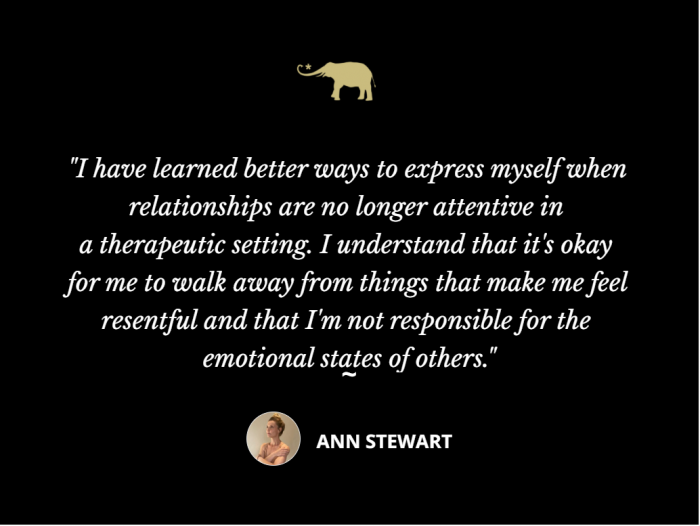View this post on Instagram
*Author’s note: This article is provided as general information. It is not a substitute for professional, medical, or health advice. If you are struggling to find the appropriate help, please be encouraged to seek guidance from a professional source.
~
I knew it was time to make a change but I wasn’t sure whom to approach.
When I opened up my personal life to a stranger seeking professional help, I developed a strong sense of individual willingness to change my circumstances. However, I had never assumed to take personal responsibility for the therapeutic relationship.
I believed that it was solely the professionals’ responsibility to keep us on track. I never thought that treatment success would require the client to take ownership and work through their difficult occurrences. I am not insinuating that anyone should continue with their therapist when it isn’t working. Also, sometimes, it just isn’t the right fit, and moving on is appropriate. But I noticed that often I felt letdown or things ended sadly.
So, perhaps my selection and navigation of these relationships hadn’t been well thought out. Personal responsibility in a professional context means that I get to choose whom I select and what I allow while building trust and connection with any teacher, counselor, or psychologist.
I firmly believe a therapist must know their personal and professional identities well. As simple as this may sound, it can be challenging to identify what constitutes boundary-crossing or a boundary violation.
A boundary crossing may become a violation when the therapeutic relationship begins to feel harmful. It can feel confusing to assess when harm begins. Small boundary crossings can include the therapist self-disclosing personal information that a client feels responsible for and exchanging gifts even with grateful intent. An important consideration isn’t always the behavior but the intention behind the behavior that could turn a well-meaning relationship into a violation.
The following suggestions could make choosing the right therapist more seamless
1. Choose carefully
As I grow and change, so does my team of support, too.
Perhaps some professionals might stay with you for a lifetime. It wasn’t enough to think about who I would feel most comfortable seeing. In truth, I needed firm boundaries but chose help that felt more comforting and amenable. Appropriately these relationships ended despite having provided me with some benefit. Unfortunately, these experiences gave me more to work through. This confession could sound discouraging, but it’s worth keeping in mind that if a therapist is willing to develop their self-awareness and take ownership of professional mistakes, it might be beneficial to work through any disagreements.
2. Agree on boundaries.
Boundaries are essential for the client’s and therapist’s safety. They delineate personal and professional roles and need to be set clearly from the start. It’s surprising how many professionals with experience and qualifications do this poorly.
Assess and monitor appropriate boundaries with an understanding that they ensure that relationships are mutually respectful, responsible, and caring. You might feel tempted to choose a geographically convenient or more inexpensive option, but instead consider an individual based on whether they can keep the relationship safe and positive.
3. Keep communicating.
It’s vital to communicate one’s feeling of unhappiness regarding advice that doesn’t feel suitable and clearly express concerns as they arise. These aren’t always easy conversations to initiate. If these discussions unfold with an uncompassionate or triggered response, you can choose to work it out or find a better match. A “good therapist” will have the ability to receive feedback without a triggered response and be flexible in opening up opportunities for these conversations to unfold.
4. Know that there should be progress.
Give careful consideration when meeting a therapist to evaluate their potential benefit. Making changes is not a linear experience. For example, let’s suppose you’ve been seeing a particular professional who is qualified in a specialized field for an extended period and without encountering any progress. In that case, it might be time to reevaluate your reasons for seeking help and get clear on your particular goals and priorities.
I have learned better ways to express myself when relationships are no longer attentive in a therapeutic setting. I understand that it’s okay for me to walk away from things that make me feel resentful and that I’m not responsible for the emotional states of others, especially not my therapist or teacher.
Currently, I am in contact with a team of people who are clear about boundaries being kind. They understand how to create safety. Family and friends have been a tremendous support as I’ve left the sangha (community) that I once considered essential. I know what to look for in a leader and understand that people with power and their perception of me isn’t the truth of who I am. I get to hold myself accountable without the idea of shaming or self-loathing.
Proper accountability moves forward with a deeper awareness of who I am and who I get to choose to continue to work with consciously.
Remember, if you’re unhappy, it’s perfectly okay to move on and begin working with someone else.












Read 2 comments and reply